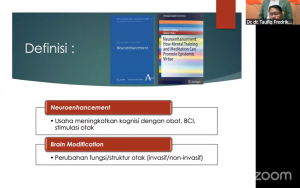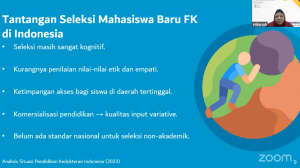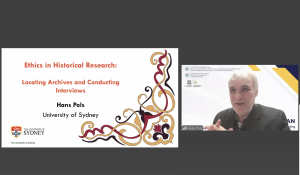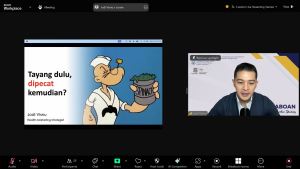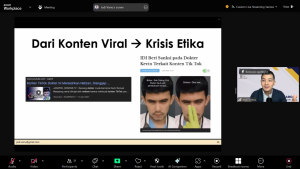
Yogyakarta, 15 October 2025 — Communication is a fundamental pillar of healthcare services. In clinical practice, clinics, and hospitals, the quality of interactions between healthcare professionals, patients, and their families often determines the outcomes of care. Yet, communication is also one of the most frequently overlooked sources of risk. Communication failure can lead to misunderstandings, delays in treatment, and even fatal medical incidents.
Recognizing the urgency of this issue, the Center for Bioethics and Medical Humanities (CBMH), Universitas Gadjah Mada, once again organized its weekly Raboan Research and Perspective Sharing on Wednesday, 15 October 2025. Conducted online via Zoom Meeting, the session carried the theme “Communication Failure” and featured dr. Rukmono Siswishanto, M.Kes., SpOG(K) as the main speaker.
In his presentation, dr. Rukmono emphasized that communication lies at the heart of healthcare delivery, as all processes—from consultation and decision-making to medical interventions—depend on accurate information exchange. However, evidence shows that communication failure is a leading cause of sentinel events, defined as unexpected incidents that result in serious patient injury or death.
Communication failures may arise from multiple factors, including unclear message content, misunderstanding of the audience, inappropriate timing, or misaligned communication objectives. Misunderstandings often stem from differences in perspectives, language, and background among those involved. Additional barriers such as assumptions, emotional responses, stress, and fatigue further hinder the effective delivery and reception of information.
Medical consultation was highlighted as the core communication process in healthcare services. Beyond information transfer, consultations must uphold key ethical principles, including beneficence (prioritizing patient well-being), respect for autonomy (honoring patients’ rights to be informed and to make decisions), justice (ensuring fair access to care), and truth-telling (transparency regarding information and conflicts of interest).
International data indicate that the number of sentinel events continues to increase annually. Many of these incidents involve delayed treatment, wrong-site surgery, retained foreign objects after procedures, and patient suicide—most of which could be prevented through effective and systematic communication among healthcare professionals.
According to dr. Rukmono, the most common forms of communication failure include insufficient or untimely information provided to patients, lack of information sharing among colleagues, poor listening skills, and failure to involve family members or caregivers in decision-making processes. Contributing factors range from individual conditions of healthcare workers and heavy workloads to unstructured communication systems and weak interprofessional collaboration.
As solutions, healthcare professionals are encouraged to improve communication at both personal and systemic levels. Recommended measures include strengthening empathy, managing stress, improving medical documentation, refining team communication workflows, and understanding patients’ backgrounds and needs. Structured communication approaches such as SBAR (Situation–Background–Assessment–Recommendation), read-back, and team briefings were recommended to minimize errors and clarify instructions.
At the conclusion of the session, dr. Rukmono underscored that effective communication is the foundation of patient safety. Improving communication systems must become part of the institutional culture in healthcare settings, and clinical communication training should be integrated from medical education through professional practice.
These efforts align with the Sustainable Development Goals (SDGs), particularly SDG 3: Good Health and Well-Being, which aims to ensure healthy lives and promote well-being for all at all ages. By strengthening communication in healthcare services, medical professionals not only enhance service quality but also contribute meaningfully to the development of a safer, more equitable, and sustainable healthcare system.
Reporter: Ardhini N, M.K.M.
Editor: Rafi



